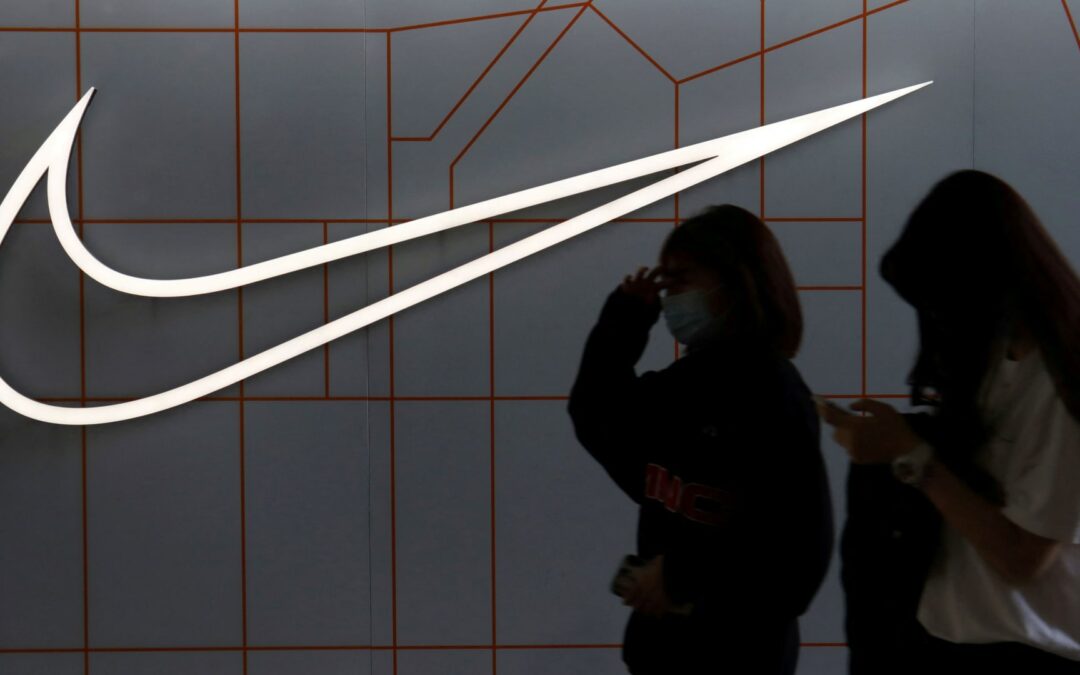People walk past a Nike sporting goods store at a shopping complex in Beijing, China, March 25, 2021.
Florence Lo | Reuters
Nike’s stock tumbled Wednesday for the 10th day in a row after Foot Locker reported dismal quarterly results and consumers continue to pull back from the footwear sector.
The sneaker giant’s shares fell about 2.5% in intraday trading. If shares close lower, the 10-day losing streak would be the longest in Nike’s history as a public company since its IPO in 1980.
Nike, which is expected to report earnings late next month, is widely considered a best-in-class retailer. Its bread and butter is the footwear business, which has faced pressure for several months.
Consumers, especially millennial shoppers who are preparing to resume student loan payments, have pulled back their spending on soft goods such as clothes and shoes in recent months and used their dollars on services and experiences.
“The U.S. consumer is becoming increasingly selective with spend. We’ve heard companies talk about wallet share shifting towards services and experiences and away from discretionary where they’re becoming a lot more selective,” Rick Patel, a retail analyst for Raymond James, told CNBC.
“There’s also an increasing amount of caution when it comes to what back half demand looks like when student loan payments resume in October. We’re talking about a consumer that’s already under pressure due to inflation that will go through even more pressure in the fall,” he said.
Commentary on slow activewear sales from department stores, athletic apparel retailers and two of Nike’s key wholesale partners, Foot Locker and Dick’s Sporting Goods, could also be weighing on its stock, said Patel.
Foot Locker on Wednesday reported another quarter of declining sales and reduced its outlook for the second time this year, just five months after introducing it. The company attributed the poor results to a slowdown in consumer spending, particularly among its lower- to middle-income target customer base.
“Looking back to March when we outlined our Lace Up plan and our longer term targets, we were coming off a strong holiday and had not yet seen the full weight of the macro environment on our lower income consumer,” CEO Mary Dillon said on an analyst call.
“This became much more evident through the second quarter including a weaker start to back to school. The store traffic and conversion challenges we began to see in late Q1 persisted through the second quarter as our customer remained cautious with their discretionary dollars,” she said.
Still, Dick’s Sporting Goods, which reported its first top- and bottom-line misses in three years on Tuesday, is still seeing strong footwear sales. What the company called “tremendous growth” in the category was a bright spot in an otherwise disappointing report.
China’s uneven recovery could also be weighing on Nike’s stock. The retailer does about a third of its business there — and its business could suffer if the economy slows.
“The investors we speak to are increasingly concerned about the outlook in China given the negative macro data points coming out of that market,” said Patel.
Data released in July indicated China’s economy, the world’s second-largest, is slowing. It reported a modest 2.5% year-over-year increase in retail sales, and youth unemployment has skyrocketed.
When Nike reported fiscal fourth-quarter earnings for the period ended May 31, it posted a 16% sales jump in the region to $1.81 billion, ahead of Wall Street’s estimates of $1.68 billion, according to StreetAccount.
Nike CEO John Donahoe told analysts at the time it’s “clear” that consumers are back in China and the Nike and Jordan brands are strong in the region.
However, it’s unclear if that growth is continuing and what the results will look like when Nike next reports earnings.









